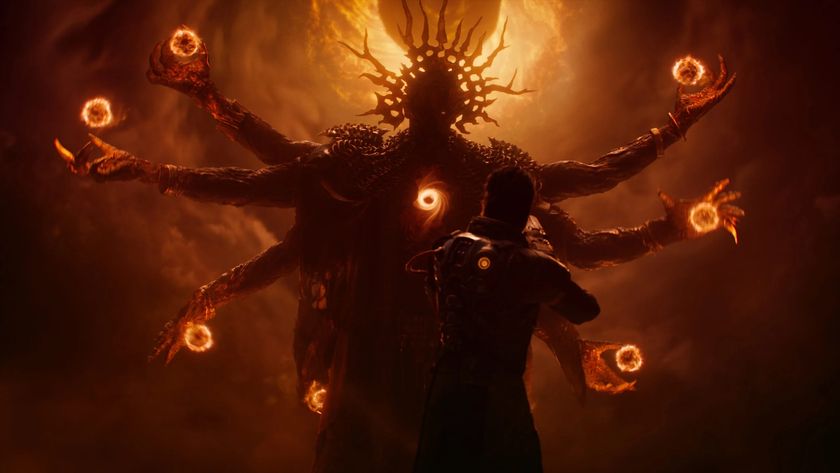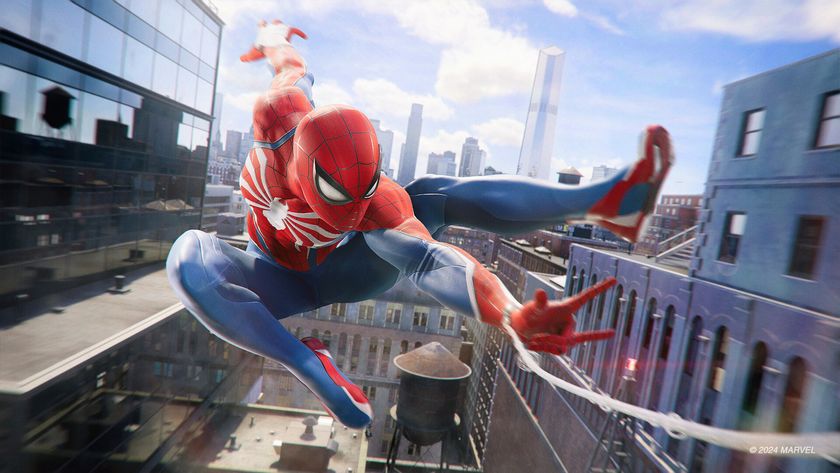Not enough new ideas in gaming? You need to check this lot out
International Festival of Independent Games finalists full of innovation, creativity and win
An abundance of sequels. Not enough publishers willing to take risks. Too many me too copycats. These are all gamer grumbles unlikely to go away any time soon. But don't despair. Far away from the charts and the mega-commercial releases and the grinning Bobby Koticks, there is an exciting world of games loaded with passionate expression, dazzling ideas and a staggering wealth of creativity. They are independent games and they are being celebrated at next month's International Festival of Independent Games, aka IndieCade.

If you are instinctively attracted to the wonders of this exciting world of independent games, may I strongly suggest you check out the 32 finalists of this year's IndieCade awards. The complete list is below, click the links to find out more and remind your brain that games can be about much more than shooting terrorists.

Above: Every Day The Same Dream. Unlikely to be picked up by Activision any time soon
Each entry has something interesting and unexpected - from the beautiful, to the chin-stroking, to the cross-eyed crazy. If you're looking to have a play, like, now, at your computer, I'd particularly recommend Continuity, Every Day The Same Dream, Fractal and VVVVV.
To find out more about IndieCade, head to www.indiecade.com
The IndieCade 2010 Finalists:
•1066 - The Game(Preloaded / Channel 4, United Kingdom): A historical game commissioned by Channel 4 (UK) to accompany it’s two part documentary series on the War of 1066 and the battle for Middle Earth. A simple, fun strategy game that leverages causal gameplay elements and beautiful design while providing its audience with interesting information and knowledge about the War of 1066. Created by Preloaded, the developers behind Super Me and other social change game projects.
Sign up to the 12DOVE Newsletter
Weekly digests, tales from the communities you love, and more
•A Slow Year(Ian Bogost, USA): A Slow Year is a collection of four game “poems” for the Atari Video Computer System, one for each season, about the experience of observation and awareness. A Slow Year stakes out a deep and interesting design problem, searching for engaging and meaningful interactivity outside the traditional reaches of modern gameplay, and typical genre design. Ian Bogot is a professor at Georgia Tech, and co-founder of Persuasive Games, creator of Airport Insecurity and a series of newsgames for the New York Times. Ian is also co-creator of IndieCade featured Cruel2BKind. A Slow Year was featured in the 2010’s Independent Game Festival (IGF) at the Game Developers Conference.
•Auditorium(Cipher Prime, USA): Auditorium is an audio puzzle game where you convert light into sound, creating an explosion of orchestral music. Its addictively simple mechanic consists of manipulating icons to deflect light into a target on each level to generate bursts of music. The game has a flexible design, allowing for a range of solutions to each puzzle. Available for PC and Mac, and now iPhone, Auditorium was created by Philadelphia-based Cipher Prime.
•B.U.T.T.O.N. (Brutally Unfair Tactics Totally OK Now)(Copenhagen Game Collective, Denmark): B.U.T.T.O.N. is a four-player, one-button party game played with Xbox controllers on the PC. The game has a WarioWare style mechanic consisting of short minigames in which players must stand back and rush the controllers to press the “right” button, although which button that is is not always clear! Created by Copenhagen Game Collective, winner of the Most Fun Game at IndieCade 2008, B.U.T.T.O.N. was a hit at Gamma IV and at IndieCade’s E3 Showcase.
•BIT.TRIP RUNNER(Gaijin Games, USA): The fourth BIT.TRIP game developed by Gaijin Games for WiiWare, BIT.TRIP RUNNER features music from Anamanaguchi driving a energetic and exciting rhythm action platforming game. The game features awesome Boss Battles inside 50 challenging levels, and provides a visually impressive experience and and auditory treat. Addictive and fun, while exploring interesting interaction and puzzle spaces inside the realm of synaesthesia.
•Blue Lacuna(Aaron Reed, USA): Blue Lacuna is among the largest text-based interactive stories ever produced, a full-length novel and adventure game in one. Blue Lacuna is rich with deep, beautiful writing, and a vast story world with emotional depth and meaningful player choice. Blue Lacuna is a triumph in prose-based interactivity from Aaron Reed, the writer and designer of Whom The Telling Changed, and a PhD candidate at the University of California, Santa Cruz.
•Cargo Delivery(Cats in the Sky, Sao Paulo, Brazil): Cargo Delivery is a skill-based puzzle game revolving around the adventures of Rufus. To achieve his goal of having a nice sailboat to call home, Rufus must sail a freighter with loads of cargo. The churning seas, which cause cargo to topple overboard, and numerous obstacles along the way, must be overcome for Rufus to earn enough money to realize his dream. The delightfully quirky graphics combine well with the cartoon physics, and make this an adventure worth taking. Created by Santo Andre, Brazil based Cats in the Sky.
•Castle Vox(Sillysoft, Canada): Castle Vox is a new turn-based strategy game from SillySoft, developers of Lux and American History Lux. Castle Vox brings the engaging multiplayer social play and strategy of Diplomacy and Axis and Allies to the digital realm of turn based strategy. A fully realized digital board game, Castle Vox takes advantage of the computer medium to ease and finesse many of the mechanics of classic social strategy board games, and wraps them into a well designed, approachable and entertaining package.
•Continuity(Ragtime Games, Sweden): A well-designed and mechanically clever mashup of a simple platformer with classic sliding puzzle gameplay. Continuity has a strong aesthetic design, and simple, refined, and well-balanced gameplay. Top notch attention to design details such as audio allow the simple pleasures of the mechanic to be presented at the forefront of the IGF-winning, addictive and entertaining game developed by Elias Holmlid, Dmitri Kurteanu, Guy Lima Jr., and Stefan Mikaelsson, aka Ragtime Games, a student team at Chalmers University of Technology, Gothenburg.
•Creaky Old Memory(DADIU, Denmark): Creaky Old Memory puts players in the role of Tatiana, an elderly Russian lady who must journey through the nooks and crannies of her self-fabricated house in order to reveal the truth about her own past. The game cleverly blends multiple modes of gameplay as you first must collect different paintings to assemble a picture of Tatiana’s life, and then must search these paintings for hidden clues to unlock the deeper mysteries of the story. Created by a team at the National Academy of Digital Interactive Entertainment in Copenhagen, Creaky Old Memories’ deftly designed aesthetics are well integrated into the story and mood of the game, and help bring genuine meaning to the puzzle-based interactivity.
•Every Day The Same Dream(Molleindustria, Italy): Made for the experimental gameplay project themed "Art game", EDTSD is an attempt to translate a well known narrative about daily routine and white collar alienation into a playable form. Only by finding subtle deviations from the repetitive, looping levels can the player free the character from a meaningless eternal present. Designed by progressive game design collective Molleindustria, Every Day the Same Dream is a short, intellectually engaging experience that brilliantly captures the feel and tone of modern art film and art games, while cutting these recognizable ideas to their core concepts. This is Molleindustria’s first game to be selected for IndieCade.
•Faraway(Steph Thirion, USA): Created by Steph Thirion for the Gamma IV showcase, Faraway is a one-button game where you swing your way through space, finding and connecting star clusters to create the most complex constellations you can. Faraway’s simple but lovely and iconic visual design lets the tightly designed interactions and gameplay take forefront. Steph Thirion is the creator of Eliss, winner of the Auteur Award at IndieCade 2009.
•FATALE(Tale of Tales, Belgium): FATALE is an interactive vignette in real-time 3D inspired by the biblical story of Salomé and the play about her by Oscar Wilde. Developed by Tale of Tales, the creators of IndieCade 2009 finalist The Path, and 2008 finalist The Graveyard, FATALE is a living tableau that allows you to freely explore many poetic, historical and literary references to the ancient legend, while bringing it relevance to a contemporary audience.
•feelforit(Chris DeLeon, USA): feelforit, developed by “Game-A-Day” virtuoso Chris DeLeon, is a small art toy for iPad, iPod Touch and iPhone, that exploits the affordances of the device’s accelerometer to create an abstract, spatialized metaphor for how we navigate our lives. By rotating the phone, you manipulate an interactive sculpture whose characteristic properties and rule sets are revealed to you as you play with it. This is the Indiecade debut of Chris DeLeon, a Carnegie-Mellon grad who is currently a master’s student in Georgia Tech’s Digital Media program.
•Fractal(Cipher Prime, USA): Go over the top with this new Audio Puzzle game. Listen as the game reacts to your decisions, taking easy-to-learn, hard-to-master gameplay to new extremes. Fractal is played on a hex grid, and leverages simple, engaging puzzles to generate beautiful procedural audio. Created by Philadelphia-based Cipher Prime, Fractal is a rewarding and compelling auditory experience.
•Gentleman of the South Sandwiche Islands(Taylor & Gray, USA): Created by a team of students in USC’s Interactive Media program, the Gentlemen of the South Sandwiche islands is a lovingly-crafted board game in which gentlemen callers compete for the attentions of Lady Ashley by strategically crossing bridges to get her alone one one of a series of small islands. A comedy of manners translated into a board game, the story, the surreal, Victorian art-style and its questionable 200-year history provide a backdrop for a devilish and highly entertaining game of absurd logic. Funded by Jim Taylor through Kickstarter, Gentleman of the South Sandwiche Islands is a great indie design story.
•Groping in the Dark(Team Arex, South Korea): Groping in the Dark is a lyrical interactive narrative that tells the story of a kidnapped girl’s decision and attempt to escape her captors. The player progresses through the narrative by manipulating phrases of Korean text to unravel the story. The kinetic typography creates an almost mystical experience, turning letters into images and images into meanings. With its alternative to traditional visual representation in games, Groping in the Dark transforms a game into interactive poetry. Created by Seoul-based Team Arex.
•Humans vs. Zombies(Gnarwhal Studios, USA): Humans vs. Zombies is a moderated game of tag where all but one player begin as humans, wearing bandanas on their arms and able to defend themselves with socks from the zaombie horde. The horde is generated by the randomly-selected “Original Zombie,” who can tag human players and turn them into zombies, who wear bandanas on their heads. Humans will need to rely on cunning and teamwork to survive the zombie apocalypse and complete challenging missions organized by the game moderators. Created by Gnarwhal Studios, Humans vs. Zombies is a played in neighborhoods, military bases, and over 600 colleges and universities around the world and was featured at this summer’s Come Out and Play. It is part of IndieCade’s Outdoor and Pervasive Games track.
•LIMBO(Playdead, Denmark): Limbo is a hauntingly beautiful black and white “horror” platform puzzler, released to widespread acclaim this summer on the Xbox Live Arcade. The game is set among the rooftops of a mesmerizing macabre world that draws you into its dark narrative. The narrative, the story of a young boy trying to find his lost sister, is reinforced by a tightly designed film noir style that also expands the interesting, well implemented 2D platforming puzzle challenges. Created by Denmark’s Playdead, Limbo is a stunning example of the quality and experience that can be created out of careful attention to detail and delicate integration of the many different elements that make up a game.
•Miegakure(Marc ten Bosch, USA): Miegakure is a platform game where you solve puzzles by exploring the fourth dimension. An inventive approach to spatial puzzle design and problem solving from Marc ten Bosch, Miegakure creates engaging and maddening puzzles from the mathematics and theory of of a fourth spatial dimension. Miegakure was featured at the IGF, and at IndieCade’s E3 showcase, and is a stunning technical and design achievement, which educates and explores fourth dimension mathematical theory without requiring a PhD in math or physics.
•Monsters (Probably) Stole My Princess!(Mediatonic, United Kingdom): Monsters (Probably) Stole my Princess! is a vertical platformer which you take control of the super sexy aristocratic demon known only as "The Duke" in a fantastical world where chasing down giant yet adorable monsters is the business at hand. The game borrows from classic platformer mechanics, embellished with frantic gameplay, novel power-ups, strategic moves, and delightful macabre-cartoon aesthetic. Created by the UK’s Mediatonic as a PSP and PS3 Mini, the game is also now available on Xbox Live.
•Recurse(Matt Parker, USA): An installation commissioned by the NYU Game Center for its “No Quarter” art game exhibition, Recurse has a simple, embodied mechanic: A video camera transforms the player’s body into a giant cursor. Crystals grow where the body intersects with objects on the screen. Players must grow Crystals in green zones while avoiding growing them in red zones. The zones shift intermittently to create new challenges. A digital game about movement in physical space, the Recurse’s distorted “funhouse mirror” encourages players to forget themselves as they twist and stretch their bodies in order to get a high score and effect the game’s abstract world. Created by New York-based artist/developer Matt Parker.
•Retro/Grade(24 Caret Games, USA): Retro/Grade is an innovative PS3 game that fuses the white-knuckle thrills and over the top visuals of a shooter with the broad appeal of a rhythm game. The developers at 24 Caret Games have deeply explored their central idea of a time-reversed space battle through tight game mechanics and polished UI and user feedback. Retro/Grade is visually engaging, attractive, and leverages its aesthetic and auditory beauty to craft an addictive and entertaining user experience.
•Sixteen Tons(Nathalie Pozzi and Eric Zimmerman, USA): Sixteen Tons, inspired by a folk song about a mining company town, is a gallery installation in which four players move heavy sections of steel pipe on a colorful grid. This simple gameplay is complicated by the social interaction of a mechanic in which players bid to hire other players (using real cash) to move their pieces, enacting the game’s central themes of debt bondage and forced labor. Created by architect Nathalie Pozzi and independent game designer Eric Zimmerman, Sixteen Tons was originally commissioned by the Art History of Games conference in Atlanta (Feb 2010). Its presentation at IndieCade is sponsored by the NYU Game Center.
•Socks, Inc.(Jim Babb/Data Played, USA): Socks, Inc. is a family-oriented alternate reality that combines web 2.0 co-creation and adventure within an imaginary world entirely populated with sock puppets. Dubbed by it’s creator “World of Sockcraft,” players socialize within an imaginary Willy-Wonka-style factory, role-playing the story of their sock puppet. A player completes missions by creating storytelling content with their puppet and distributing it via video and still images. As a part of IndieCade, Socks, Inc. will host a sock puppet creation workshop, where participants can create an avatar, an account, and play through the first missions. Socks, Inc., created by New School Master’s Student Jim Babb/Data Played, debuted at ARGfest 2010 in Atlanta, and is part of IndieCade’s Outdoor and Pervasive Games track.
•Solace(One Man Down, USA): Solace is an interactive aesthetic experience utilizing dynamic audio and “bullet hell” overtones to provide a unique perspective on the five stages of grief. One Man Down, a design team from Digipen Institute of Technology, has produced impressive visuals and audio to build a fully realized mood space for the game. Solace does not settle on traditional gameplay inside this environment, but explores “bullet hell” mechanics to reinforce the mood and message of the game.
•Spirits(Spaces of Play, Germany): Spirits is an action-puzzle game for iPhone, iPod Touch and iPad with a Lemmings-style mechanic in which players manipulate the wind to guide name-giving Spirits towards each level of the game world. The wind, which is both helpful and uncontrollable, can serve as the player’s friend and enemy at the same time. The game’s unique atmosphere is created by a combination of beautifully hand-drawn graphics and a music track comprised completely of orchestral musical instruments. Created by Berlin-based Spaces of Play.
•Tic-Tac-Totum(Jesse Fuchs, USA): Tic-Tac-Totem is an “open source” tabletop game that uses the traditional game elements of dice and poker chips in clever and novel ways. The game rules, which consist of mini-games that determine the outcome of a Tic-Tac-Toe game, are presented and constantly modified via wiki. This is the IndieCade debut of developer Jesse Fuchs.
•The Cat And The Coup(Peter Brinson, USA): The Cat and the Coup is a documentary game in which you play the cat of Dr. Mohammed Mossadegh, the first democratically elected Prime Minister of Iran. You observe and coax Mossadegh through the events of the coup as the cat, knocking over objects on the Prime Minister’s desk and scratching him. With it’s striking visual style and engaging mechanic, The Cat and The Coup brings a completely original novel ach to documentary gameplay. Developer Peter Brinson is the creator of IndieCade exhibited Meanwhile and a member of the team that created Waco Resurrection.
•The Games of Nonchalance(Nonchalance, USA): An epic, immersive, poly-media, real-world adventure. Four episodes of interactive content lead participants on a journey through the fabric of San Francisco and discover the threads of a narrative woven into the city's past and present. Currently running in San Francisco, the Games of Nonchalance received the "Best of the Bay" SFBG 2009 award. Nonchalance’s Scoop!, a live pirate radio news game, was featured at Come Out and Play 2010. This is their debut game as part of IndieCade’s Outdoor and Pervasive Games track.
•TRAUMA(Krystian Majewski, Germany): TRAUMA takes you into the subconscious of a young woman who survives a car accident as you explore her dreams and memories. The game has a compelling aesthetic and interaction design that involves navigating 3D photographs using a novel, gesture-based interface, drawing you intuitively into its narrative dreamspace. TRAUMA is a quintessential next-generation adventure game, an emerging genre among indie developers. Created by Polish-born, Cologne-based design student Krystian Majewski.
•VVVVVV(Terry Cavanagh, Ireland): In VVVVVV, you play as the fearless leader of a team of dimension-exploring scientists who are separated after inadvertently crashing their ship. A high energy, cleverly designed platforming experience from Terry Cavanaugh, creator of Don’t Look Back and Self Destruct, VVVVVV deeply explores its central gravity-reversing mechanic through smart, interesting puzzles and a strong world and environment, supported by simple but compelling visual design and awesome music.
And while we're on the subject of indie games, I feel compelled to spread the word of Leave Home. It'smostly a side-scrollingshooter with 8-bit tendencies and an acid hangover. It's one of the most blindingly creative games I've played in years. It's on the Xbox Live Indie channel. Go check that shit out.
September 3, 2010
Most Popular








